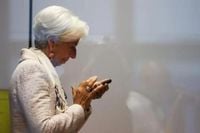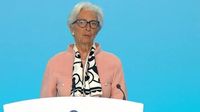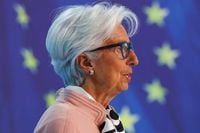On April 17, 2025, the European Central Bank (ECB) made a significant move by lowering its key interest rates for the seventh time since June 2024, reducing the deposit rate from 2.50% to 2.25%. This decision, announced by ECB President Christine Lagarde during a press conference, was made unanimously by the governing council and reflects ongoing efforts to stimulate the Eurozone economy amidst a backdrop of global uncertainty.
Lagarde emphasized the importance of this rate cut, stating, "The disinflation process is progressing well," and underscored the ECB's commitment to achieving a sustainable stabilization of inflation at the medium-term target of 2%. However, she also cautioned that the economic outlook is clouded by "extraordinary uncertainty," particularly due to the aggressive tariff policies implemented by the U.S. government, which have created significant volatility in the financial markets.
During her remarks, Lagarde highlighted the negative effects of these tariffs, noting that they contribute to a demand shock that could impact economic growth in the Eurozone. She explained, "We are aware that it is a negative demand shock. We can assume that it will affect growth to some extent, but the net effects on inflation will become clearer over time." This uncertainty has led to increased downside risks for economic growth, with Lagarde stating that these tensions could dampen exports and lead to declines in both investment and consumption.
Despite the challenges, Lagarde expressed cautious optimism regarding signs of economic growth within the Eurozone. She noted that the region has demonstrated resilience against global shocks and mentioned that the unemployment rate had recently fallen to 6.1%, the lowest level since the Euro's introduction. Lagarde remarked, "There are signs of stabilization in production," indicating that the economic landscape may be shifting positively.
In response to a journalist's question regarding the potential impact of the German stimulus package on economic growth, Lagarde acknowledged that while it might fuel growth, the effects on prices remain unclear. She reiterated the importance of central bank independence in navigating these turbulent times, stating, "Central bank independence in the Eurozone is fundamentally important." Lagarde also confirmed that the ECB did not discuss any stimulating policies during the meeting, maintaining a cautious approach to monetary policy.
The press conference concluded with Lagarde addressing future monetary policy decisions, emphasizing that the ECB would not commit to a specific interest rate path in advance. "We must be prepared for the unpredictable," she stated, reflecting the current climate of economic uncertainty.
Market reactions to the ECB's decision were mixed. While the rate cut was anticipated, experts like Lena Dräger from the Kiel Institute for the World Economy expressed that a more substantial reduction of half a percentage point would have been appropriate given the current trade tensions. Dräger noted, "The rate cut is not a panacea for the struggling economy in the Eurozone," highlighting the need for further measures to invigorate growth.
Silke Tober from the Hans Böckler Foundation echoed this sentiment, stating, "The central bank should go further and announce further easing of monetary policy in the future." This perspective underscores the belief among some economists that the ECB's current strategies may not be sufficient to combat the sluggishness of the Eurozone economy, which only saw a growth rate of 0.2% in the final quarter of 2024.
As the Eurozone grapples with these economic challenges, Lagarde's remarks serve as a reminder of the delicate balance central banks must maintain in response to both domestic and international pressures. The ECB's decision to lower interest rates is part of a broader strategy aimed at fostering economic recovery, but the path forward remains fraught with uncertainty.
Looking ahead, Lagarde indicated that the ECB would continue to monitor economic indicators closely, with the next meeting scheduled for June, where further discussions on tariffs and monetary policy will take place. She noted, "We will not have complete clarity on tariffs by the June meeting," suggesting that the evolving geopolitical landscape will continue to influence economic decisions in the Eurozone.
In conclusion, as the ECB navigates these turbulent waters, the focus will remain on fostering a resilient and competitive Eurozone economy capable of withstanding external shocks while striving to achieve the inflation target set forth by the central bank.







